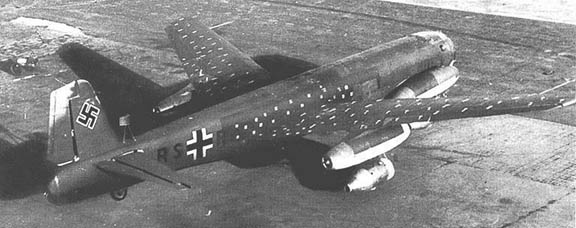LUFTWAFFE RESOURCE CENTER > SECRET PROJECTS & PROTOTYPES > PREVIOUS PAGE

This is the Ju 287 V1 Testbed, preparing for airflow tests.
IMAGE GALLERY
|
Type: Heavy Bomber Origin: Junkers Flugzeug und Motorenwerks AG Model: V1 to V3 Crew: V3: Three First Flight: Ju 287 V1: August 16, 1944 Ju 287 V2: 1947 by Soviet Union Number of Flights: V1: 17 Number Produced: 2, (V3) not completed Engine: Ju 287 V1 & V2: Model: Junkers Jumo 004 Type: Turbojets Number: Four Thrust: 1,980lb (900kg) Note: Four 2,645lb (1,200kg) thrust Walter 501 takeoff assistance rockets also mounted. Ju 287 V3: Model: BMW 003A Type: Turbojets Number: Six Thrust: 1,760lb (800kg) |
Dimensions: Span: 65 ft. 11¾ in. (20.11m) Length: Ju 287 V1: 60 ft. 0½ in. (18.30m) Height: N/A Wing Area: N/A
Weights:
Performance: Armament: Two MG 131 in remote control tail barbette. Bombs: Ju 287 V3 8,818 lb. (4000 kg) |
Comments:
One of the strangest Luftwaffe aircraft to ever claw it's way into the air was the Junkers Ju 287. Begun in early 1943, the Ju 287 incorporated many advanced aerodynamic concepts, the most striking being the swept forward wings. This design feature was deemed radical enough to warrent the construction of a testbed aircraft, pictured above. This testbed flew on August 16, 1944. The aircraft was a Frankenstien's monster, pieced together from several diffent aircraft. Included were the nosewheels from two B-24 Liberators, the fuselage of an He 177, mainwheels off a Ju 352, and the tail was constructed of Ju 388 parts.
17 test flights proved the concept to have excellent handling characteristics and would have proven a problem had not the allies overrun the testing airfield, capturing the the V1 and the nearly complete V2. The V2 was flown by the Soviet Union in 1947. The V3 failed to get off the drawing board and would have had several improvements.
Sources:
Gunston, Bill & Wood, Tony - Hitler's Luftwaffe
LUFTWAFFE RESOURCE CENTER > SECRET PROJECTS & PROTOTYPES > PREVIOUS PAGE
